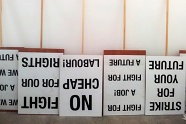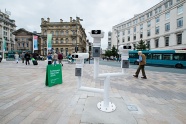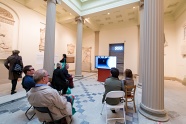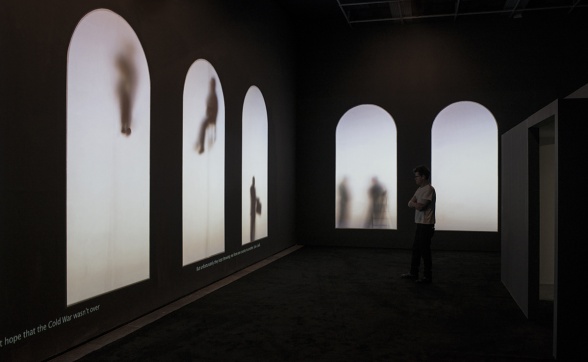
Krzysztof Wodiczko, Guests, 2009. Installation view at FACT for Liverpool Biennial 2016. Photo: Jon Barraclough
Krzysztof Wodiczko, Guests, 2009. Installation view at FACT for Liverpool Biennial 2016. Photo: Jon Barraclough
On display at FACT for Liverpool Biennial 2016 is an exhibition of works by Lucy Beech, Krzysztof Wodiczko and Yin-Ju Chen.
Lucy Beech’s new film Pharmakon is an interpersonal drama that explores how disease operates in an era of mass communication. The film focuses on female group dynamics, and how support networks can care for the individual whilst conversely intensifying symptoms. It examines how connectivity in this context can be both illness and remedy, and how diagnosisis dependent on our ability to impose particular narratives on the body. Shot and produced in sites across Liverpool, the screenplay has been developed through the artist’s active engagement with therapy groups, advocacy websites, patient forums, and interviews with clinicians working within the field of delusional infestation.The film is also part of the Software episode.
For Krzysztof Wodiczko, a flashback means traumatic re-emergence of memories from the past, characterised by psychological conditions such as Post Traumatic Stress Disorder (PTSD). This presentation brings together exhibits from over 40 years spent working in collaboration with marginalised communities such as war veterans and the homeless. Wodiczko’s large-scale installation Guests (2011), originally commissioned for the 53rd Venice Biennale, forms a central part of the exhibition, reflecting in this context on the current migratory crisis and debates around immigration. Veteran Helmet was created in 2015, and uses technology and prosthetics to aid veterans suffering from PTSD to share their experience of the condition. Other works include the Homeless Vehicle Project (1988–89), for which Wodiczko worked with members of the homeless community in New York to create tools to aid their survival and communication.
The land of Lemuria sank into the ocean thousands of years ago, but its natives have been living invisibly amongst us ever since. In the 1960s, some of them re-emerged, using the identities of conceptual artists such as Donald Judd, Robert Smithson and Carl Andre. Yin-Ju Chen’s work, Extrastellar Evaluations, part of the Flashback episode, brings together evidence of Lemurian presence on earth, and considers the impact of the 1960s as a defining era for humans and Lemurians alike. For humans, civil-rights struggles, the Cuban Missile Crisis and Vietnam shook the status quo, but for Lemurians, the era was characterised by severe weather events that disrupted their communication with their motherland. As a result, they were pushed to invent extreme methods of transmission that involved the creation of large-scale geometric devices, understood by humans as conceptual artworks.
FACT (Foundation for Art and Creative Technology) is a media arts centre which hosts a year-round programme of exhibitions, film and engagement projects. When the FACT building opened in 2003, it was the first purpose-built arts centre in Liverpool for more than 60 years. It features three gallery spaces, four cinema screens, and a workshop space.
Lucy Beech is commissioned by Liverpool Biennial and FACT. Yin-Ju Chen is commissioned by Liverpool Biennial in collaboration with CFCCA and Kadist Foundation. Collaborating Curators: Mike Stubbs, Ana Botella, Lesley Taker and Amy Jones.
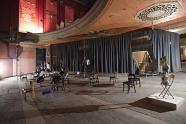
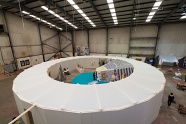
Liverpool Biennial
55 New Bird Street
Liverpool L1 0BW
- T +44 (0)151 709 7444
- info@biennial.com
Liverpool Biennial is funded by
Founding Supporter
James Moores



